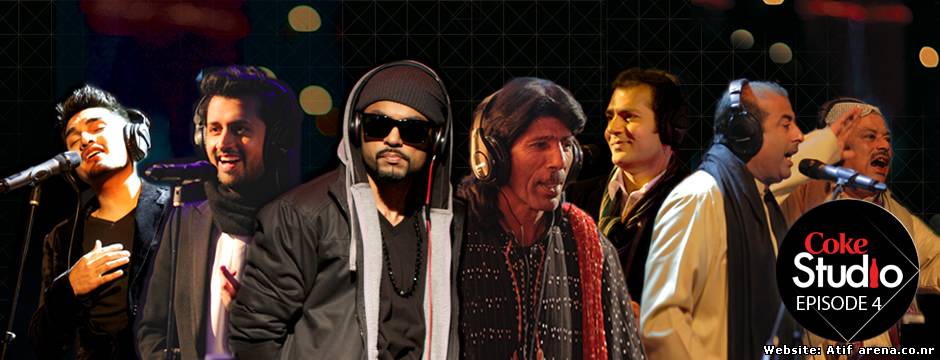|

By Sheharyar Rizwan
This Sunday saw Coke Studio present its fourth session of the ongoing
season. This episode featured the likes of Uzair Jaswal, Atif Aslam,
Bohemia teaming up with the Chakwal group, Hamayoon Khan, and the
combination of Fareed Ayaz and Abu Muhammad.
Hamayoon Khan appears once again for his rendition of a combination
of two Pashtu folk songs – "Tora Bahraam Khaana/Tora Da Jalkay” –
bearing similar themes. Both the folk songs revolve around lovers
singing for their beloveds, who are dark complexioned. But through these
folk love songs the lovers try to express the fact they unconditionally
love the other person, irrespective of their facial appearance. Like
Hamayoon’s "Larsha Pekhawar Ta, Tora Baram Khanna” also includes Pashtu
couplets or tappas. The modern touch rendered to Pashtu music comes as a
breath of fresh air in Hamayoon’s mellifluous and perfectly regional
dialect that does complete justice to both folk songs. Such an addition
to Coke Studio can only be an attempt to make it bigger and better.
Next in the line up was the "Kandyaari Dhol Geet” by the Chakwal
group-Bohemia combo. Now, after the breathtaking "Ishq Aap Bhi Awalla”,
expectations had risen from this immensely talented little-known group.
Their typical vernacular immediately develops a connection with the
listener, even who doesn’t have much know-how of their style of music.
Plus, with them teaming up with the contemporary Bohemia, one could
expect an explosive fusion of two altogether different forms of music.
"Kandyaari Dhol Geet” is a love song by Aziz Lohar, a contemporary of
the Chakwalis. It’s a fusion between contrasting tragedies of love: one
joyfully sung by the Chakwalis referring to spiritual love; and the
other by Bohemia relating to people lost in material realm. Though not
as mind-blowing as the group’s last performance, this one does leave its
own mark. But one thing’s for sure, the Chakwal group is an impressive
and promising discovery and they sure can contribute immensely to the
national music scene.
Moving on, Fareed Ayaz and Abu Muhammad performed "Rung”: a qawwali
of Amir Khusro’s poetry, resounding with the purity, soul and
spirituality of Sufism.
This qawwali had also been a usual finale of various gatherings
because of the spiritual effect it is said to have on people. This
version of the qawwali is considered to be the closest to the original
rendition by Amir Khusro. Earlier in the same season, Hadiqa Kiyani also
presented her own version of the qawwali, and now this time by the duo.
This is just to show how the same poetry can be presented in two
contrasting forms, yet leave the same spiritual impact. This also goes
to show how traditional music can be experimented on a revived to keep
it alive among future generations. Just like qawwali never fails to
leave a devout affect on the listener, this one also proved to be music
to the ears, even for a layman.
Next up was Uzair Jaswal who’s slowly creating waves in the music
industry with his fresh and romantic voice. This guy sure is becoming a
hit favourite among the younger generation and is being touted as the
next big thing. Uzair rendered one of his own compositions, "Bolay”,
which is very different from his other songs. Most of his other songs
are sad and mellow and this time, after the massive success of his
"Nindiya Ke Paar”, Uzair wanted to do something that would appeal more
to people of his own generation.
This song represents the freedom, love and a carefree sense of life
during one’s youth – one that Uzair hopes will touch the younger lot.
This light-hearted track, played with a typical eastern folk beat,
promises to be as big, if not less, as his previous Coke Studio
presentation.
Last but not the least in this week’s line-up was Atif Aslam who
performed a new song, "Dholna”, which was originally supposed to be on
one of Atif’s albums. It talks about the singer’s journey, about the
idea of searching for someone and turning to God in pain of separation
from his beloved. The search for God and yearning for closeness makes
the person stronger and see the Sufi idea of ‘true love’ in a different
way. To give this presentation a more authentic spiritual feel, Atif
mixed it with a section of Nusrat Fateh Ali Khan’s magnanimous qawwali,
"Shaana Uchiyan”, and added a whole new dimension to it. Maybe this
decision proved to be a saving grace for this otherwise disappointing
number.
|